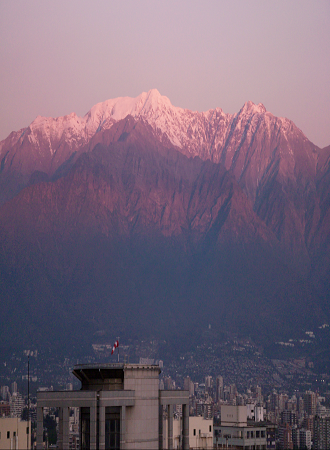
The Cordillera of Dreams 2019
Distributed by Icarus Films, 32 Court St., 21st Floor, Brooklyn, NY 11201; 800-876-1710
Produced by Renate Sachse
Directed by Patricio Guzman
Streaming, 85 mins
College - General Adult
Chile; Filmmaking; Latin American History; Pinochet Dictatorship
Date Entered: 12/09/2019
Reviewed by Elena Landry, George Mason Libraries, Fairfax, VACompleting the trilogy Patricio Guzman started with his Nostalgia for the Light, and continued in The Pearl Button, his The Cordillera of Dreams poignantly resumes his theme of trying to connect the insentient majesty of nature with the overwhelming tragedies of human suffering.
Guzman uses the stories of several prominent artists, such as singer Javiera Parra, documentarian Pablo Salas, sculptors Vicente Gajardo and Francisco Gazitua, and author Jorge Baradit, to show how the isolating and simultaneously protecting Andes have influenced and inspired Chilean culture, just as the atrocities of the dictatorship of Augusto Pinochet have traumatized it. People are clearly shaped, and scarred, by their environment. Guzman muses about what the mountains might tell about Chile’s history of human cruelty and oppression. The more pertinent question is what can we, as thinking, feeling humans living today, do about this mess we’ve made of our planet?
The past does not speak through indifferent mountains, symbolic though we may feel them to be. It does speak, however, through the courageous work of people like Guzman’s fellow documentarian Pablo Salas, who filmed the oppression of the Pinochet era, and stayed in Chile to chronicle the continuing struggles of his country in its aftermath. Salas clearly saw, and recorded, what was happening then, and eloquently describes how the economic policies of neoliberalism in Chile are further deepening the chasm between rich and poor there.
If you want the history of Chile to speak to you, look to the film archives of Pablo Salas, as well as Guzman’s own The Battle of Chile , not to the silent Andes. While we may reflect all we like upon nature, nature does not reflect upon human tumult and suffering, loudly as we might shout our laments at a frozen, rocky landscape. Volcanoes and earthquakes may make us think of revolution and war, but the connection is only in our thoughts. In the end, this connection is as illusory as white subtitles displayed over snow and clouds. We may dream of the Cordillera, but it does not dream of us.
I would recommend this film to anyone interested in documentary filmmaking, particularly the works of Patricio Guzman.
Awards
2019 L'oeil d'or Prix Best Documentary Award